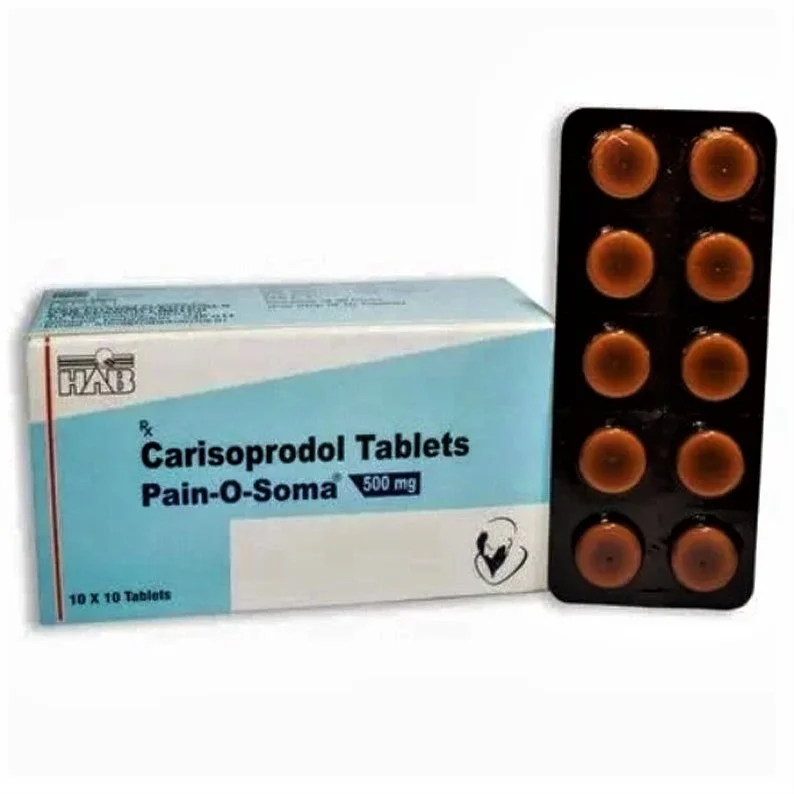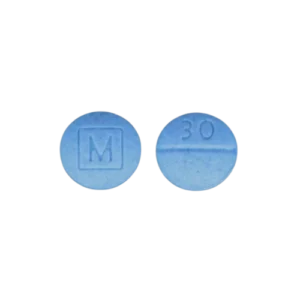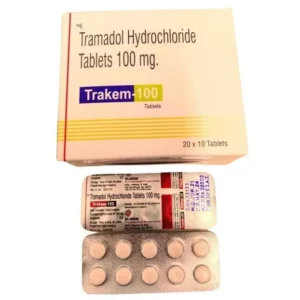Soma (Carisoprodol) is a centrally acting muscle relaxant commonly prescribed for the relief of acute musculoskeletal pain and discomfort. Doctors commonly prescribe the 500mg formulation for short-term relief of symptoms related to muscle injuries like strains, sprains, and other musculoskeletal conditions. While Soma provides effective short-term relief, healthcare providers do not recommend it for long-term treatment due to its potential for dependence and adverse effects.
Mechanism of Action
Soma operates by affecting the central nervous system (CNS). Specifically, experts believe that carisoprodol exerts its therapeutic effects by inhibiting the transmission of pain signals between the nerves and the brain. Though researchers have not fully clarified carisoprodol’s precise pharmacological mechanism, they think it induces sedation and muscle relaxation, thus reducing spasm and tension within skeletal muscles. By altering the way the CNS processes pain, Soma provides patients with symptomatic relief during the acute phase of muscle injury or strain.
Indications for Soma 500mg
Doctors primarily prescribe Soma 500mg for:
- Acute musculoskeletal pain: It is often indicated for short-term relief from muscle pain resulting from strains, sprains, or other minor injuries.
- Muscle spasms: Soma may be prescribed to manage muscle spasms that arise due to overexertion, poor posture, or underlying conditions such as fibromyalgia or cervical radiculopathy.
- Adjunctive therapy: Doctors frequently use it in conjunction with physical therapy to help facilitate more comfortable movement during rehabilitation and recovery from musculoskeletal injuries.
Administration and Dosage
The typical dosing regimen for Soma 500mg involves taking one or two 500mg tablets three times daily and potentially an additional dose at bedtime, depending on the patient’s symptoms and physician’s recommendation. It is essential to adhere strictly to the prescribed dosage, as misuse or overuse of Soma can lead to significant adverse effects. Doctors usually prescribe Soma for short periods, often ranging from a few days to two weeks, to minimize the risk of dependence and tolerance.
Adverse Effects
While Soma effectively treats acute muscle pain and spasms, it carries several potential side effects. The most commonly observed include:
- Sedation and drowsiness can affect daily activities and the ability to concentrate.
- Dizziness and lightheadedness can worsen with rapid changes in posture or physical exertion.
- Headache and nausea may occur and could improve by taking the medication with food.
- Gastrointestinal disturbances, such as constipation or abdominal discomfort, may also occur
More severe adverse effects, though rare, include:
- Respiratory depression and hypoventilation, especially when combined with other CNS depressants such as alcohol or benzodiazepines.
- Severe allergic reactions, including urticaria (hives), angioedema, and anaphylaxis in susceptible individuals.
- Seizures: This is a serious concern, particularly in those with a history of seizure disorders or those using higher-than-recommended doses.
If any of these severe reactions occur, it is imperative that the patient immediately cease the medication and seek emergency medical attention.
Contraindications and Precautions
Doctors should use caution when prescribing Soma, and in some cases, it may be contraindicated for certain individuals:
- Patients with a history of substance abuse or dependency may be at higher risk for developing an addiction to Soma due to its sedative and euphoric effects.
- Individuals with severe hepatic or renal impairment should avoid Soma, as the drug is metabolized in the liver and excreted by the kidneys. Impaired function of either organ can lead to increased concentrations of the drug in the bloodstream, thereby enhancing the risk of side effects.
- Respiratory conditions, including sleep apnea or chronic obstructive pulmonary disease (COPD), may be aggravated by Soma’s CNS depressant effects, which can lead to respiratory failure in severe cases.
- Pregnancy and breastfeeding: Soma is classified as a Category C drug for pregnancy, indicating that it may cause harm to the fetus if taken during pregnancy. Therefore, doctors should prescribe it only if the potential benefits outweigh the risks. Since carisoprodol also passes into breast milk, healthcare providers should avoid using it during lactation if possible.
Drug Interactions
Soma has the potential to interact with various other medications, leading to either diminished effectiveness or heightened risk of adverse effects. Significant interactions include:
- CNS depressants, such as alcohol, benzodiazepines, opioids, and certain antidepressants. When combined with Soma, these substances can exacerbate CNS depression, leading to profound sedation, respiratory depression, and even coma.
- CYP450 enzyme inhibitors, particularly those affecting the liver enzyme CYP2C19, can increase Soma’s concentration in the bloodstream, increasing the risk of toxicity. Examples include fluconazole and certain antidepressants.
- Anticonvulsants, like phenytoin and carbamazepine, may decrease the efficacy of Soma by inducing liver enzymes that speed up its metabolism.
Conclusion
Soma 500mg serves as an effective, short-term option for relieving muscle spasms and pain, particularly following injuries or musculoskeletal conditions. However, due to the potential for misuse, dependence, and severe side effects, doctors must use the drug strictly according to medical guidelines. Healthcare providers should monitor patients closely during treatment to ensure efficacy and minimize the risk of adverse outcomes. As with any prescription medication, it is imperative to engage in an open discussion with a healthcare provider about the risks, benefits, and any potential drug interactions before initiating therapy. If you want to buy soma online then you need to have a valid doctor prescription.






